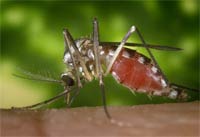This news item expired on Friday, December 30, 2016 so the information below could be outdated or incorrect.
Keep away those pesky neighbors… Please Tip & Toss
Protect yourself, your family and your neighborhood from serious diseases that ticks can spread, such as Rocky Mountain Spotted Fever, and Lyme disease, and diseases mosquitoes can spread including Ehrlichiosis increase, LaCrosse encephalitis and West Nile Virus.
Check out this video where local girl & boy scouts encourage Buncombe County citizens to Tip & Toss...
Follow these simple instructions to fight tick bites!
Avoid Direct Contact with Ticks
- Avoid wooded and bushy areas with high grass and leaf litter.
- Walk in the center of trails.
Repel Ticks with DEET or Permethrin
- Use repellents that contain 20 to 30% DEET (N, N-diethyl-m-toluamide) on exposed skin and clothing for protection that lasts up to several hours. Always follow product instructions. Parents should apply this product to their children, avoiding hands, eyes, and mouth.
- Use products that contain permethrin on clothing. Treat clothing and gear, such as boots, pants, socks and tents with products containing 0.5% permethrin. It remains protective through several washings. Pre-treated clothing is available and may be protective longer.
- Other repellents registered by the Environmental Protection Agency (EPA) may be found here.
Find and Remove Ticks from Your Body
- Bathe or shower as soon as possible after coming indoors (preferably within two hours) to wash off and more easily find ticks that are crawling on you.
- Conduct a full-body tick check using a hand-held or full-length mirror to view all parts of your body upon return from tick-infested areas. Parents should check their children for ticks under the arms, in and around the ears, inside the belly button, behind the knees, between the legs, around the waist, and especially in their hair.
- Examine gear and pets. Ticks can ride into the home on clothing and pets, then attach to a person later, so carefully examine pets, coats, and day packs.
- Tumble clothes in a dryer on high heat for an hour to kill remaining ticks. (Some research suggests that shorter drying times may also be effective, particularly if the clothing is not wet.)
Follow these simple "tip & toss" instructions to fight mosquito bites!
Mosquitoes breed in standing water and we have lots of that around due to regular rainfall. Mosquitoes must have water to complete their life cycle and usually stay close to their breeding area, removing and/or treating the sources of standing water around your home is the most important tool in your control.
Follow these simple “tip and toss” instructions and you can help fight the bite!
- Get rid of tin cans, plastic containers, ceramic pots or similar water-holding containers on your property.
- Empty standing water from used or discarded tires that may have accumulated on your property (e.g. tire swings).
- Drill holes in the bottom of recycling containers that are left outdoors.
- C
 lean clogged roof gutters on an annual basis, particularly if the leaves from surrounding trees have a tendency to plug up the drains.
lean clogged roof gutters on an annual basis, particularly if the leaves from surrounding trees have a tendency to plug up the drains.
- Turn over plastic wading pools when not in use.
- Turn over wheelbarrows and do not allow water to stagnate in birdbaths.
- Change water in birdbaths and wading pools on a weekly basis.
- Aerate ornamental pools or stock them with fish.
- Clean and chlorinate swimming pools that are not being used. Be aware that mosquitoes may even breed in the water that collects on swimming pool covers.
If mosquitoes are still bugging you after you have “tipped and tossed” away all water sources, the CDC recommends that you:
- Use insect repellents containing DEET (50 percent DEET for adults and 30 percent DEET for kids), picaridin, or oil of lemon eucalyptus. Re-apply repellent if mosquitoes start to bite, always following label instructions.
- Permethrin is a repellent/insecticide that can be applied to clothing and will provide excellent protection through multiple washes. You can treat clothing yourself (always follow the directions on the package!) or purchase pre-treated clothing. For best protection it is still necessary to apply other repellent to exposed skin. (Taken from CDC)
- Many mosquitoes are most active between dawn to dusk. Avoid outdoor activity or take extra care to use a repellent and wear long sleeves and pants during this time, or consider avoiding outdoor activities.
- Fix or install window and door screens.
Making the small choice to “tip and toss” can lead to big health benefits. It begins where we live, work and play and by reducing the standing water from the places you occupy, you reduce mosquito bites, lessening the chance of contracting the diseases they may carry. These actions can improve health – and certainly comfort – in your neighborhood.
For more information on vector-borne diseases, visit:
- NC Department of Health and Human Services
- Centers for Disease Control and Prevention